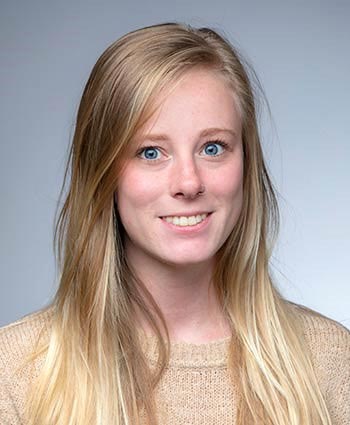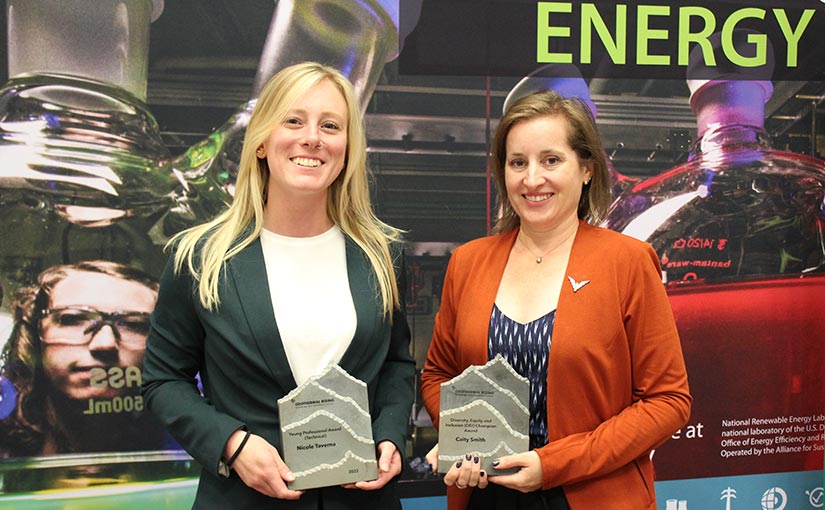Advancing Geothermal Data Through the Eyes of an Early-Career Scientist

If every journey starts with one footstep, Nicole Taverna knew exactly where to begin: Colorado.
A love of science led her to focus on physics and other STEM courses as a teenager in Pennsylvania, but the lure of the West ultimately guided her path to the National Renewable Energy Laboratory (NREL).
Taverna is a member of the Data Analytics, Tools, and Applications Group within the NREL Strategic Energy Analysis Center. Along with her other responsibilities, she helps locate priority geothermal energy drilling locations through combining and analyzing relevant data. For the past five years, she has curated the Geothermal Data Repository, which celebrates its 10th anniversary this year. She has also expanded her expertise to include machine learning, interactive data visualization, and data pipeline development, as well as statistical methods and analyses, primarily focused on geothermal energy.
"I kind of specialize in solving problems," Taverna said. "I do that using data science and data analytics. Whatever approach makes sense."
Watching the arc of her career, her curiosity for science guided it all. She landed an internship out of high school doing geophysical surveys with an environmental consulting firm and then held an internship at NREL during college.
While studying geophysics and minoring in computer science at the Colorado School of Mines, she realized a career in the oil and gas industries was not for her.
"I wanted to study energy, and I would rather do something renewable, so I ended up in geothermal," she said. "I got to go out in the field and do geophysical surveys, and I think that helped set it more in stone for me. That passion for field work was what drove me here, but my desire to use data analytics and data science to create a better future has kept me moving in a similar direction."
As a young female data scientist working in geothermal energy, Taverna finds herself in a unique situation. She views the industry with fresh eyes and feels a duty to analyze traditional industry norms for ways new scientific methods may advance the field.
"I just want to come in with a new and open creative mind and change the way we think about these kinds of things. We've been doing it the same way for so long. Are there better ways to do things knowing what we know now?" she said. "More broadly than just geoscience, I want to apply that way of thinking anywhere I can. I want to change the norm in some ways to improve our scientific abilities."
Taverna is interested in data-centric machine learning, which is focused on improving the quality of the data rather than improving the model parameters. She also wants to continue to create better access to well-managed and secure data for the geothermal industry.
"Another thing I am really into right now is reducing our reliance on expert opinions within geothermal exploration, using statistics to improve our understanding of how things work," she said. "The human brain is imperfect and prone to bias. We can't think of everything, and it's hard for our brains to overcome preconceived ideas."
While the future is pointing toward machine learning and artificial intelligence, she said it is also important to focus on doing it right.

"I don't think we should be rushing to replace everything with machine learning. We need to be careful about it. How can we improve what we're doing, as opposed to replace?" Taverna said. "Those are the things I'm really passionate about right now, that are really driving my research today."
Taverna said she found a new sense of confidence while working on the recent DEEPEN project. She traveled to Iceland for a workshop on geothermal energy, meeting up with many European experts and counterparts. DEEPEN aims to provide better understanding of the roots of magmatic geothermal systems. The project is a multinational collaboration among several universities, institutes, and energy companies.
"It was really cool to be in a room with all of them and learn from them, but also to feel confident enough to share my opinion," she said. "The DEEPEN project has given me freedom to think and problem solve, but also it's given me a lot of confidence."
Taverna is now poised to help mentor young students and show them paths toward careers in renewable energy. She can relate. Early on in her career, she found that the industry could be rather intimidating to young professionals. Since then, she has found a voice, learning that "you don't always need to obey the hierarchy. New ideas are what lead to scientific advancement," she said. "Your opinion is worth sharing, even if you don't think so in the moment."
Becoming a member of the Women in Geothermal (WING) organization also proved helpful in terms of networking and advancing her career.
"Nicole is a strong contributor to NREL's geothermal research projects," said Amanda Kolker, NREL laboratory program manager for geothermal research. "Her multidisciplinary skill set related to geophysics and data science is a solid asset to the program, and her reliability and enthusiasm make her a pleasure to work with. The scientific and geothermal communities are fortunate to have her expertise!"
Taverna received the 2022 Geothermal Rising Young Professional Award (Technical) and was recognized at the Geothermal Rising Conference, Aug.28–31, 2022.
Learn more about NREL geothermal research.
Last Updated May 28, 2025
